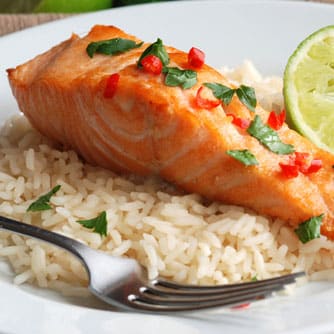In that previous research has found that fatty acids (omega-3) in fish may lower risk of cardiovascular disease by decreasing inflammation, resisting oxidative stress and improving blood pressure, cardiac and blood vessel function, a large-scale analysis of data collected on 84,493 postmenopausal women enrolled in the US Women’s Health Initiative Observational Study shows that the type of fish and the cooking method may affect heart failure risk. Donald Lloyd-Jones, from Northwestern University Feinberg School of Medicine (Illinois, USA), and colleagues found that postmenopausal women who ate the most baked/broiled fish (five or more servings/week) had a 30% lower risk of heart failure, as compared to women who seldom ate it (less than one serving/month). Eating fried fish was associated with increased heart failure risk: just one serving a week was associated with a 48% higher heart failure risk. As well, the team found that dark fish (salmon, mackerel and bluefish) were associated with a significantly greater risk reduction than either tuna or white fish (sole, snapper and cod). The researchers conclude that: “Increased baked/broiled fish intake may lower [heart failure] risk, while increased fried fish intake may increase [heart failure] risk in postmenopausal women.”
Healthily Prepared Fish May Help to Lower Heart Failure Risk
Rashad J. Belin, Philip Greenland, Lisa Martin, Albert Oberman, Lesley Tinker, Jennifer Robinson, Joseph Larson, Linda Van Horn, Donald Lloyd-Jones. “Fish Intake and the Risk of Incident Heart Failure: The Women's Health Initiative.” Circ Heart Fail., May 24 2011.
RELATED ARTICLES




